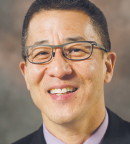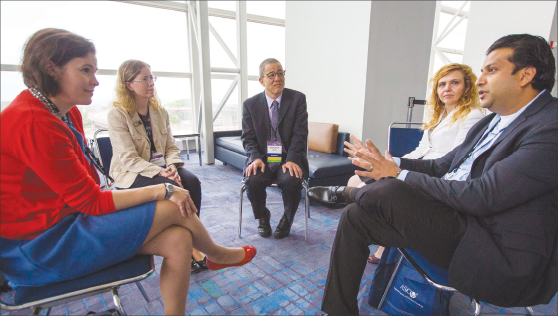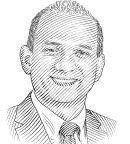The ASCO Post introduces this new department, Living a Full Life, in which we will share insightful narratives of oncology professionals highlighting personal aspects of these clinicians’ lives separate from the world of oncology. We also intend to open a dialogue about the challenges that today’s busy oncologists face in maintaining a healthy work-life balance.
ANTHONY BACK, MD

Affiliation: University of Washington and Fred Hutchinson Cancer Research Center, Seattle
How I decompress: Exercise, meditation, cooking
Favorite author: “Virginia Woolf. She really worked with the texture of consciousness of everyday life. She saw through the everyday realities to something deeper.”
Takeaway: “Be grateful every day.”
For this first installment in the Living a Full Life series of articles, Anthony Back, MD, of the University of Washington, Seattle, and Fred Hutchinson Cancer Research Center, was interviewed by Guest Editor Jame Abraham, MD, FACP. Dr. Back has published widely on professional stresses faced by cancer clinicians, in particular, burnout syndrome.
Physician burnout has been defined in the literature as a triad of components characterized by (1) emotional exhaustion [“I just cannot get it together today to go into this patient’s room because it is just too sad;”] (2) cynicism or depersonalization [“No matter what I do things won’t change;”] and (3) feelings of low self-accomplishment [“I’m working harder and harder and getting less done.”] Dr. Back said: “Every oncologist has had one or more of these symptoms; however, when they pile up and persist over time, that’s when there’s a risk of burnout.”
Dr. Back explained that prior to the research available today, burnout was considered a separate condition from depression: Burnout was something people experienced in their professional lives, as opposed to life-consuming clinical depression. “But now it is becoming clear that burnout can merge into depression and turn into depression. And although it is not fully fleshed out in the research, I think there’s a continuum between burnout at work and all-out clinical depression that can be linked to substance abuse and suicide,” he noted.
Reasons for an Uptick in Burnout
Given today’s challenging health-care environment, Dr. Abraham asked Dr. Back to put burnout into contemporary context. Dr. Back responded, “There are data looking at national surveys indicating the incidence of burnout [among health-care professionals] is increasing. Although it’s difficult to nail down specific reasons for this escalation, there are some cultural changes that have affected clinician quality of life.”
Burnout is like being at the edge of a cliff. It seems like you are doing okay until suddenly you find yourself falling.— Anthony Back, MD
Tweet this quote
“For instance, over the past decade, we’ve seen a shift from a majority of physicians being in practice for themselves to becoming employees in larger group practices, where other people and systems define much of their work. That is a huge cultural shift in expectations one might have going into the profession and thinking you are going to have control over your clinical work and recognizing that’s not the case.”
According to Dr. Back, the advent of the electronic medical record (EMR) processes and regulatory mandates for clinical documentation have changed the administrative expectations of physicians in a way that has altered one’s sense of control. “Prior to electronic records, an attending physician could expertly communicate a clinical issue on an inpatient’s chart in a four-line note. However, EMR medicine is loaded with complex documentation, driven largely by billing, which is really not that sophisticated but has forced physicians into the role of documenters, a role that distresses a lot of us and can add to the potential for burnout,” suggested Dr. Back. Patient expectations have also changed, he added, and expectations have risen that oncologists will provide them with the next new medicine.
Preventing Burnout
Dr. Back stressed the importance of early self-detection of pre-burnout symptoms, noting that waiting until one meets the criteria for burnout is usually to have waited too long. “In this highly complex environment, we as physicians need to recalibrate ourselves to a set of reasonable expectations given our particular clinical challenges and today’s environment. The pace of everything has actually changed so much that it is not humanly possible to be a one-person expert who is available to patients at all times. I see the new generation of oncologists dealing with attendings who grew up in a different health-care environment, one that didn’t have all of the quality metrics, the explosion of new drugs, and the documentation and safety requirements that younger doctors grapple with today. A young physician who lacks resiliency skills in this work environment could easily run into problems leading to burnout.”
He continued: “As a community of practitioners, we need to have a dialogue about burnout and develop strategic workplace interventions and work processes that enable physicians to perform at the top of their game without losing sight of their own needs as a person.”
Recognizing Burnout
To recognize burnout, Dr. Back explained, it is important to look at oneself before trying to identify burnout in others. For example, when you find your stress level is growing and your irritability is increasing, and these feelings are not going away, it is time to stop and get a sense of what you are feeling. He recommends talking to someone. It may be a psychologist or well-being counselor, but the important point is to act. “Burnout is like being at the edge of a cliff. It seems like you are doing okay until suddenly you find yourself falling,” he said.
We are instruments of healing. That takes work, and we shouldn’t be ashamed to recognize this.— Anthony Back, MD
Tweet this quote
“I think it is really important to do something for yourself every day. You need to make sure that as an oncologist, you are in good shape to do the demanding, though amazing and satisfying work you do.” Dr. Back added: “We are instruments of healing. That takes work, and we shouldn’t be ashamed to recognize this.”
He advises doctors to think about their professional well-being as a constant maintenance plan and find something that’s going to renew and refresh them every day. “It might be taking a walk or sitting on the couch and talking with a partner.” Asked what he does to maintain a sense of well-being every day, Dr. Back said he exercises every day and has a meditation practice that he devotes time to daily.
When a Patient Dies
The death of a patient is an integral component of any oncologist’s career. Recognizing how a patient’s death affects the physician as an individual is an overlooked yet essential element of a person’s well-being. Dr. Abraham discussed how the death of a patient can impact the treating clinician. This is a subject that Dr. Back has written about, most notably in a book published with his colleagues titled, Mastering Communication With Seriously Ill Patients: Balancing Honesty With Empathy and Hope.

Anthony Back, MD (center), leads a physician wellness session during Physician Wellness: Refresh and Reboot at the ASCO Annual Meeting. Photo by ©ASCO/Rodney White.
“It’s important for physicians to create a way to discharge all the emotions that go along with a patient’s death. For instance, find someone to talk to—could be another oncologist, a nurse practitioner, or a trusted colleague. In the process of detoxifying ourselves of the loss, it’s also important to find something to take away from each clinical episode. “You need to consider an element of gratitude. Many of our patients leave us important experiences when they die; it might be a gesture or a phrase, but they help us be better for other patients,” revealed Dr. Back.
In addition, it is important to construct emotional boundaries between work and home. Dr. Back elaborated: “Given the emotional toll oncology practice can have, it is vital to recognize when you leave the clinic and go home that you’re moving from one world to another, and it’s important to keep those two worlds separate. If the clinic bleeds over into your home life, both suffer. Of course, at times we all bring our work home, but we need to be disciplined and not let it eat up the bandwidth of our home life.”
ASCO Refresh and Reboot
ASCO has continued its mission to develop interventions to encourage physician wellness. At this year’s Annual Meeting, Dr. Back returned to lead a resiliency skills–based educational session called “Physician Wellness: Refresh and Reboot.” Asked how this session came to be, Dr. Back said, “Many oncologists find the magnitude of the Annual Meeting quite stressful, so I thought it would be an appropriate venue to teach skills with the potential to help physicians manage their stress and keep their internal and external environments balanced. It allows people to practice being resilient, even at a meeting, where there’s always too many things to do, too many people to talk to, and too many interesting sessions to attend.”
Closing Thoughts
Dr. Back draws his inspiration for maintaining a work-life balance from many sources, such as cognitive-behavioral therapy, mindfulness, and insight-oriented psychotherapy. He told Dr. Abraham, however, that he is often reminded of a quote a mentor once shared with him: You may love your institution, but do not expect your institution to love you back. “That was a practical piece of advice that liberated me from a certain kind of overarching expectation and any sense of entitlement I might have developed,” said Dr. Back. “I realized it was up to me to make my life meaningful.”
Asked to share his advice with other oncologists, Dr. Back said it is crucial to recognize the impact we have on others. “It’s not just about the big things,” he said, adding “be grateful every day.” ■
DISCLOSURE: Dr. Abraham and Dr. Back reported no conflicts of interest.
GUEST EDITOR

Jame Abraham, MD, FACP
Dr. Abraham is the Director of the Breast Oncology Program at Taussig Cancer Institute, and Professor of Medicine, Lerner College of Medicine, Cleveland Clinic.
Living a Full Life: Let Us Hear From You
We encourage you to contact us if you would like to be interviewed about your own experiences and interests or would like to nominate a candidate. We are seeking to learn what motivates and inspires you and how you manage to achieve balance in your own life.
Write to editor@ASCOPost.com and reference Living a Full Life.

